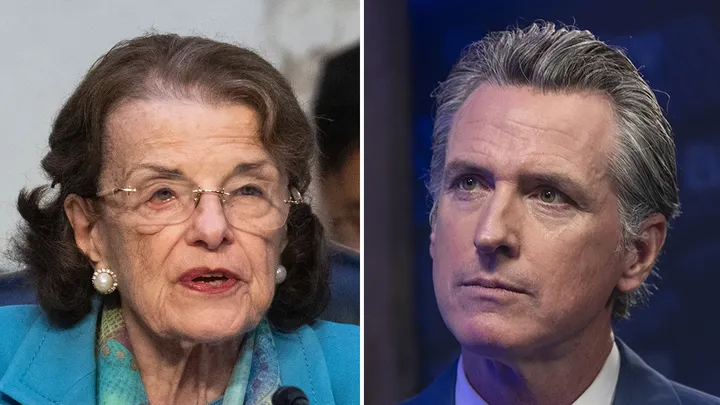Pollsters said this month they wanted Newsom to appoint someone for a full term in place of Feinstein

With the vacant seat of Sen. Dianne Feinstein, D-Calif., all attention is fixed on the Golden State’s governor to see whom he will appoint as her successor.
The seat is fiercely contested ahead of the 2024 election, and the governor’s choice will carry significant implications for the deep blue stronghold that serves as the embodiment of Democratic policies.
Governor Gavin Newsom, under mounting pressure to swiftly name a replacement as the Democrats’ narrow majority teeters on the brink amid an imminent government shutdown, has previously pledged to appoint a Black woman. He faced criticism when he appointed then-Secretary of State Alex Padilla to fill the seat left by then-Sen. Kamala Harris before she assumed the vice presidency. Newsom pointed out that there are currently no Black women in the Senate following Harris’s departure.
He had also previously indicated his reluctance to decide on the vacant seat. On Friday, the NAACP reminded Newsom, saying, “Now the time has come for you to fulfill your promise.”
“When you openly promised to appoint an African American woman to Sen. Feinstein’s seat if given the opportunity, the entire African American community in California and around the nation celebrated,” the NAACP emphasized in the letter, as reported by the Associated Press. The letter bore the signatures of NAACP President Derrick Johnson and Rick Callender of the California-Hawaii conference.
However, Newsom had previously indicated that he would not select any of the three candidates competing for Feinstein’s coveted seat if it were to become vacant before the election. These three prominent Democratic Representatives include Katie Porter, Barbara Lee, and Adam Schiff. It remains uncertain whether he will reconsider this stance. The governor’s office declined to comment on this matter for this story.
Barbara Lee, a Black woman who represents Oakland, California, and is one of the three contenders for the Senate in 2024, expressed her concern after Newsom suggested appointing a caretaker until the next senator is chosen.
“The notion that a Black woman should only be appointed as a caretaker to merely fulfill a checkbox is demeaning to the countless Black women across this country who have consistently propelled the Democratic Party to victory in election after election,” Lee wrote on X, formerly known as Twitter, earlier this month.
Republican James Bradley, a U.S. Coast Guard veteran, has thrown his hat into the ring among more than a dozen other candidates. However, it’s virtually certain that Governor Newsom will choose a Democrat as Feinstein’s replacement.
Another viable contender for the position is 75-year-old Shirley Weber, the California Secretary of State, and a Black woman. Newsom appointed her to this role in December 2020.
In a statement issued on Friday, Governor Newsom paid an extensive tribute to Feinstein but made no mention of her potential successors.
“Dianne Feinstein was many things — a powerful, trailblazing U.S. Senator; an early advocate for gun control; a leader during times of tragedy and chaos. But to me, she was a dear friend, a lifelong mentor, and a role model not only for me but also for my wife and daughters, showing us what a powerful and effective leader looks like,” Newsom remarked.
According to recent polls conducted by UC Berkeley and the Los Angeles Times this month, Adam Schiff leads the pack in the primary race with 20% support, closely trailed by Katie Porter at 17%. Barbara Lee and James Bradley are further behind with 7% each. The poll gathered opinions from 6,030 California voters.
The survey also highlighted that a majority of California voters prefer Governor Newsom to appoint someone for a full term rather than just an interim term to complete Feinstein’s tenure.
These candidates are gearing up for a significant showdown in the March 5 primary, where the top two candidates with the most votes will advance to the General Election.
California employs a top-two primary system, often referred to as a “jungle primary.” This system means that all candidates, regardless of their party affiliation, appear on a single primary ballot. Consequently, candidates from various political parties compete against each other in the primary, setting the stage for a highly competitive and diverse political landscape.

